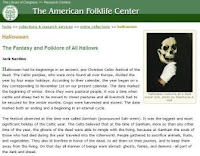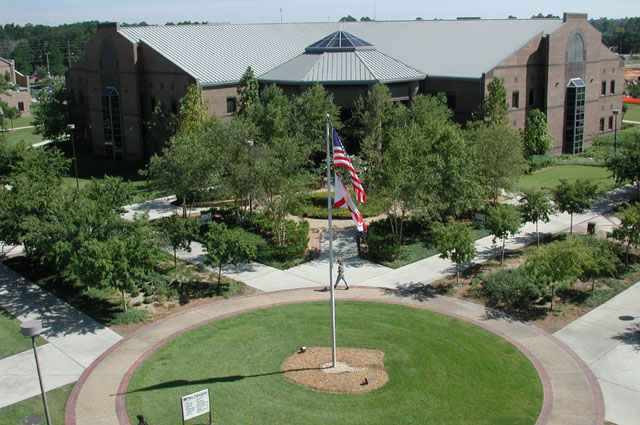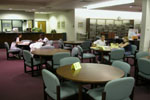TCC Library and Halloween
 "Samhain became the Halloween we are familiar with when Christian missionaries attempted to change the religious practices of the Celtic people. In the early centuries of the first millennium A.D., before missionaries such as St. Patrick and St. Columcille converted them to Christianity, the Celts practiced an elaborate religion through their priestly caste, the Druids, who were priests, poets, scientists and scholars all at once. As religious leaders, ritual specialists, and bearers of learning, the Druids were not unlike the very missionaries and monks who were to Christianize their people and brand them evil devil worshippers.
"Samhain became the Halloween we are familiar with when Christian missionaries attempted to change the religious practices of the Celtic people. In the early centuries of the first millennium A.D., before missionaries such as St. Patrick and St. Columcille converted them to Christianity, the Celts practiced an elaborate religion through their priestly caste, the Druids, who were priests, poets, scientists and scholars all at once. As religious leaders, ritual specialists, and bearers of learning, the Druids were not unlike the very missionaries and monks who were to Christianize their people and brand them evil devil worshippers.As a result of their efforts to wipe out "pagan" holidays, such as Samhain, the Christians succeeded in effecting major transformations in it. In 601 A.D. Pope Gregory the First issued a now famous edict to his missionaries concerning the native beliefs and customs of the peoples he hoped to convert. Rather than try to obliterate native peoples' customs and beliefs, the pope instructed his missionaries to use them: if a group of people worshipped a tree, rather than cut it down, he advised them to consecrate it to Christ and allow its continued worship."

an excerpt from "The Fantasy and Folklore of All Hallows"
Halloween: the Fantasy and Folklore of All Hallows - The American Folklife Center
Library of Congress Research Centers http://www.loc.gov/folklife/halloween.html
============================
HALLOWEEN BOOKS AT THE TCC LIBRARY
Death makes a holiday : a cultural history of Halloween by David Skal: Bloomsbury, 2002
 Halloween : from pagan ritual to party night by Nicholas Rogers, Oxford University Press, 2002
Halloween : from pagan ritual to party night by Nicholas Rogers, Oxford University Press, 2002Halloween and other festivals of death and life from University of Tennessee Press, 1994
Tricks & treats : the ultimate Halloween book by Deborah Harding, Reader’s Digest Association, 1998
Halloween program sourcebook from Omnigraphics, 2000
find more items (books & dvds) under subjects
============================
DVDs & Movies at the Library
( a selection of titles)

- Haunted Histories Collection: History Channel
- Curse of Frankenstein [monsters]
- Horror of Dracula [vampires]
- Mummy Returns [mummies]
- Shaun of the Dead [zombies]
- Stephen King's Silver Bullet [werewolves]
- Wolf [
 werewolves -Jack Nicholson & Michele Pfeiffer]
werewolves -Jack Nicholson & Michele Pfeiffer]
Websites of interest
History Channel's History of Halloween
view "The Real Story of Halloween": Ancient Origins; Halloween Comes to America; Today's Traditions; Around the World; and Historic Haunts!
Also, watch Halloween videos, play the Hidden Spirits game, and learn about the history of the Jack O' Lantern.
 TCC Library has the History Channel's Haunted Histories Collection on DVDs, available for checkout: includes: The Haunted History of Halloween; Vampire Secrets; Salem Witch Trials; Poltergeist; and Hauntings
TCC Library has the History Channel's Haunted Histories Collection on DVDs, available for checkout: includes: The Haunted History of Halloween; Vampire Secrets; Salem Witch Trials; Poltergeist; and Hauntings============================
Halloween: the Fantasy and Folklore of All Hallows
The American Folklife Center, Library of Congress Research Centers
an excerpt from "The Fantasy and Folklore of All Hallows" appeared above -
another excerpt from LOC's Folklife Center:
"The old beliefs associated with Samhain never died out entirely. The powerful symbolism of the traveling dead was too strong, and perhaps too basic to the human psyche, to be satisfied with the new, more abstract Catholic feast honoring saints. Recognizing that
 something that would subsume the original energy of Samhain was necessary, the church tried again to supplant it with a Christian feast day in the 9th century. This time it established November 2nd as All Souls Day--a day when the living prayed for the souls of all the dead. But, once again, the practice of retaining traditional customs while attempting to redefine them had a sustaining effect: the traditional beliefs and customs lived on, in new guises.
something that would subsume the original energy of Samhain was necessary, the church tried again to supplant it with a Christian feast day in the 9th century. This time it established November 2nd as All Souls Day--a day when the living prayed for the souls of all the dead. But, once again, the practice of retaining traditional customs while attempting to redefine them had a sustaining effect: the traditional beliefs and customs lived on, in new guises.All Saints Day, otherwise known as All Hallows (hallowed means sanctified or holy), continued the ancient Celtic traditions. The evening prior to the day was the time of the most intense activity, both human and supernatural. People continued to celebrate All Hallows Eve as a time of the wandering dead, but the supernatural beings were now thought to be evil. The folk continued to propitiate those spirits (and their masked impersonators) by setting out gifts of food and drink. Subsequently, All Hallows Eve became Hallow Evening, which became Hallowe'en--an ancient Celtic, pre-Christian New Year's Day in contemporary dress.
============================
History of Halloween
an excerpt from Halloween History : "Early national attention to trick-or-treating was given in October 1947 issues of the children's magazines Jack and Jill and Children's Activities, and by
 Halloween episodes of the network radio programs The Baby Snooks Show in 1946 and The Jack Benny Show and The Adventures of Ozzie and Harriet in 1948. The custom had become firmly established in popular culture by 1952, when Walt Disney portrayed it in the cartoon Trick or Treat, Ozzie and Harriet were besieged by trick-or-treaters on an episode of their television show, and UNICEF first conducted a national campaign for children to raise funds for the charity while trick-or-treating."
Halloween episodes of the network radio programs The Baby Snooks Show in 1946 and The Jack Benny Show and The Adventures of Ozzie and Harriet in 1948. The custom had become firmly established in popular culture by 1952, when Walt Disney portrayed it in the cartoon Trick or Treat, Ozzie and Harriet were besieged by trick-or-treaters on an episode of their television show, and UNICEF first conducted a national campaign for children to raise funds for the charity while trick-or-treating."============================
UNICEF Halloween Fundraising
an excerpt from their website: " The tradition of 'Trick-or-Treat for UNICEF' began in 1950 in the United States, when Philadelphia schoolchildren first went door-to-door at Halloween collecting money in decorated milk cartons to help their global peers.
They raised a grand total of $17, kicking off a campaign that has since brought in millions of dollars each year to help UNICEF provide medicine, better nutrition, safe water, education, emergency relief and other support to children in more than 150 countries."
============================
Urban Legends of Halloween
 What would Halloween be without a few urban legends to tell ?
What would Halloween be without a few urban legends to tell ?"Like a coven of busy witches, we've cooked up a special selection of Halloween legends foryour enjoyment! Follow the links below to view a collection of Halloween-specific urban legends. If that still doesn't satisfy your appetitie for ghoulish tales, take a look at our collection of horror legends."
============================
Religious Tolerance.org
looks at the controversial issue of Halloween celebrations in public schools:
from their site: "To most people, Halloween is a fun time. To others, it a time when Satan and his demons are particularly active, and when children are in real danger. . . .What we see is a conflict between two world concepts:
The "Belief of Satan under Every Rock": a fear which has remained essentially unchanged since the 15th Century, that Satan and his hordes of demons exist, are profoundly evil, and are ready to possess the mind of any child who engages in celebrations which have Pagan roots.
The "Secular View": a belief that children can engage in fantasy and enjoy what has become a secular holiday without endangering their eternal souls."
============================
Christian Answers Network on Halloween
Asks the question, should Christians participate in Halloween observances? Read their responses to the issues. An excerpt from their site:
"What about church “Harvest Festivals” held on October 31? Although we understand the rational and good intentions behind them, we don't think they are the best approach. Our family tends to agree with the author of an article called " Are 'Harvest Parties' for Christians?" (written by a self-avowed former witch and now active Christian). Harvest parties on October 31 tend to assume that "our children need something to take the place of Halloween, since they won't be participating in the secular and pagan celebrations. It suggests our kids are missing out on something. And indeed they are, if we allow them to spend Halloween in celebration." There are better things to do on Halloween than partying."
============================
Wishing A Safe and Happy Halloween for all who may choose to celebrate this holiday.




